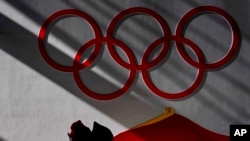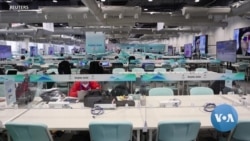Journalists at the Beijing Olympics have a tough assignment. Not only do they face a vast number of pandemic-related restrictions, they also will be working in one of the world’s least friendly countries for media.
Amid concerns about China’s surveillance and mistreatment of the press, many journalists at the Winter Games tell VOA they are using “burner” devices, such as phones and laptops completely wiped of personal data, to protect their digital privacy.
“I set up a burner computer … I have a burner phone. I even have a burner iPad with me,” said James Griffiths, Asia Correspondent for The Globe and Mail, a Canadian newspaper. “I haven’t come across anyone who isn’t using at least some kind of burner device.”
Ahead of the Winter Olympics, the Committee to Protect Journalists warned that reporters’ phones and laptops could be contaminated with malware while in China. “Assume that everything you do online will be monitored,” read a CPJ advisory.
China ranked 177th out of 180 in Reporters Without Borders’ 2021 World Press Freedom Index, only two places above North Korea. Not only does the country employ an army of censors to maintain its so-called “Great Firewall,” it is also the world’s largest jailer of journalists, with at least 128 detained, the organization said.
Earlier this week, the Foreign Correspondents’ Club of China released a report warning media freedom in the country is declining at “breakneck speed.” It said China-based foreign reporters faced physical assaults, cyber hacking, visa denials, and growing threats of legal action.
A bubble tradeoff
Foreign journalists at the Beijing Olympics have reported no problems so far, even if they have extremely limited mobility due to COVID-19 precautions.
“I’m currently connected to the Beijing 2022 Internet, which you can get across the various venues and as far as we can tell it’s completely uncensored. I don’t know how monitored it might be, of course, but at least things aren’t blocked,” said Griffiths.
“They said they were going to do this, and they have delivered. But then of course, we’re in a bubble,” he added.
Reporters at the Beijing Olympics won’t see much of China at all. Instead, they’ll be in a closed loop, taking only official buses from venue to venue. It’s part of China’s “zero-COVID” strategy, which has attempted to eliminate COVID-19, despite the emergence of the highly transmissible omicron variant.
The restrictions have made journalism more difficult, in certain respects.
“It’s really hard to get a feel for what these Games mean to the people here in Beijing, because the only person you could really ask is a member of the workforce or a volunteer. Trying to report on what’s happening outside the closed loop is not an option,” said Donna Spencer, a sports reporter for The Canadian Press news agency.
Spencer says she, too, brought “clean” laptops and phones to Beijing and is using virtual private networks, or VPNs, which can provide a degree of privacy for Internet connections. So far, she says she’s experienced no problems.
“It’s this very weird sort of juxtaposition. We are free to report — within the closed loop,” she said.
The only way in
The conditions may not be ideal, but for many journalists it was the only way to get back into China, said Eryk Bagshaw, North Asia correspondent for The Sydney Morning Herald.
“The Olympics presented an opportunity that we may not get again,” said Bagshaw, who also brought clean laptops, phones, and even new email addresses to Beijing.
In recent years, Beijing has delayed or refused the issuance of visas for foreign journalists. However, many journalists at the Beijing Games were issued visas through the International Olympics Committee.
But Bagshaw conceded that the bubble has greatly simplified reporting in China — for better and for worse.
“You’re essentially submitting yourself to such total surveillance that there’s almost freedom in that,” he said. “There’s cameras absolutely everywhere — you’re not looking over your shoulder wondering if you’re being tailed because you’re speaking to a Chinese dissident.”







